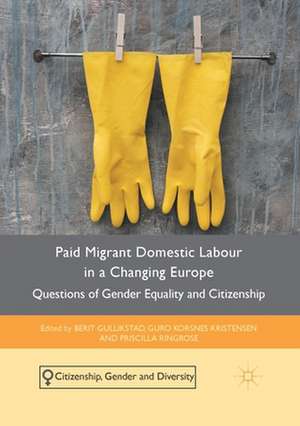Paid Migrant Domestic Labour in a Changing Europe: Questions of Gender Equality and Citizenship: Citizenship, Gender and Diversity
Editat de Berit Gullikstad, Guro Korsnes Kristensen, Priscilla Ringroseen Limba Engleză Paperback – 26 aug 2019
Preț: 200.30 lei
Nou
Puncte Express: 300
Preț estimativ în valută:
38.33€ • 39.87$ • 31.65£
38.33€ • 39.87$ • 31.65£
Carte tipărită la comandă
Livrare economică 14-28 aprilie
Preluare comenzi: 021 569.72.76
Specificații
ISBN-13: 9781349704002
ISBN-10: 1349704008
Pagini: 266
Ilustrații: XVI, 266 p.
Dimensiuni: 148 x 210 mm
Greutate: 0.34 kg
Ediția:1st ed. 2016
Editura: Palgrave Macmillan UK
Colecția Palgrave Macmillan
Seria Citizenship, Gender and Diversity
Locul publicării:London, United Kingdom
ISBN-10: 1349704008
Pagini: 266
Ilustrații: XVI, 266 p.
Dimensiuni: 148 x 210 mm
Greutate: 0.34 kg
Ediția:1st ed. 2016
Editura: Palgrave Macmillan UK
Colecția Palgrave Macmillan
Seria Citizenship, Gender and Diversity
Locul publicării:London, United Kingdom
Cuprins
Chapter 1. Paid Migrant Domestic Labour, Gender Equality and Citizenship in a changing Europe: An Introduction; Berit Gullikstad, Guro Korsnes Kristensen and Priscilla Ringrose.- Chapter 2. Neoliberal Citizenship and Domestic Service in Finland: A Return to a Servant Society; Lena Näre.- Chapter 3. The Au Pair Scheme as ‘Cultural Exchange’: The effects of the Norwegian Au Pair Policy on Gender Equality and Citizenship; Berit Gullikstad and Trine Annfelt.- Chapter 4. Paid Domestic Work in Spain: Gendered Framings of Work and Care in Policies on Social Citizenship; Elin Peterson.- Chapter 5. Gendered Work and Citizenship. Diverse Experiences of Au Pairing in the UK; Rosie Cox and Nicky Busch.- Chapter 6. From Intimate Relations to Citizenship? Au Pairing and the Potential for Citizenship in Norway; Elisabeth Stubberud.- Chapter 7. Citizenship and Maternalism in Migrant Domestic Labour. Filipina Workers and Their Employers in Amsterdam and Rome; Sabrina Marchetti.- Chapter 8. Paid migrant Domestic Labour in gender Equal Norway: A Win-Win Arrangement?; Guro Korsnes Kristensen.- Chapter 9. The Intouchables: Care Work, Homosociality and National Fantasy; Priscilla Ringrose.- Chapter 10. Unequal fatherhoods: Citizenship, Gender and Masculinities in Outsourced ‘Male’ Domestic Work; Ewa Palenga-Möllenbeck.- Chapter 11. Buying and Selling Gender Equality: Concluding Reflections; Guro Korsnes Kristensen, Berit Gullikstad and Priscilla Ringrose.
Notă biografică
Berit Gullikstad is Associate Professor of Gender Research at the Department of Interdisciplinary Studies of Culture, the Norwegian University of Science and Technology, Norway.
Guro Korsnes Kristensen is Researcher at the Department of Interdisciplinary Studies of Culture, the Norwegian University of Science and Technology, Norway.
Priscilla Ringrose is Professor of Gender Studies and French Literature at the Department of Interdisciplinary Studies of Culture and The Department of Language and Literature, the Norwegian University of Science and Technology, Norway.
Textul de pe ultima copertă
This book analyses the changing face of work, gender equality and citizenship in Europe. Drawing on in-depth research conducted in nine different countries, it focuses on the discourses, social relations and political processes that surround paid domestic labour. In doing so, it rethinks the vital relationship between this kind of employment, the formal and informal citizenship of migrant workers and their employers, and the cultural and political value of gender equality. Approaching these as fluid, complex and interrelated phenomena that change according to local context, it will appeal to sociologists, political scientists, geographers, anthropologists and gender studies scholars.















